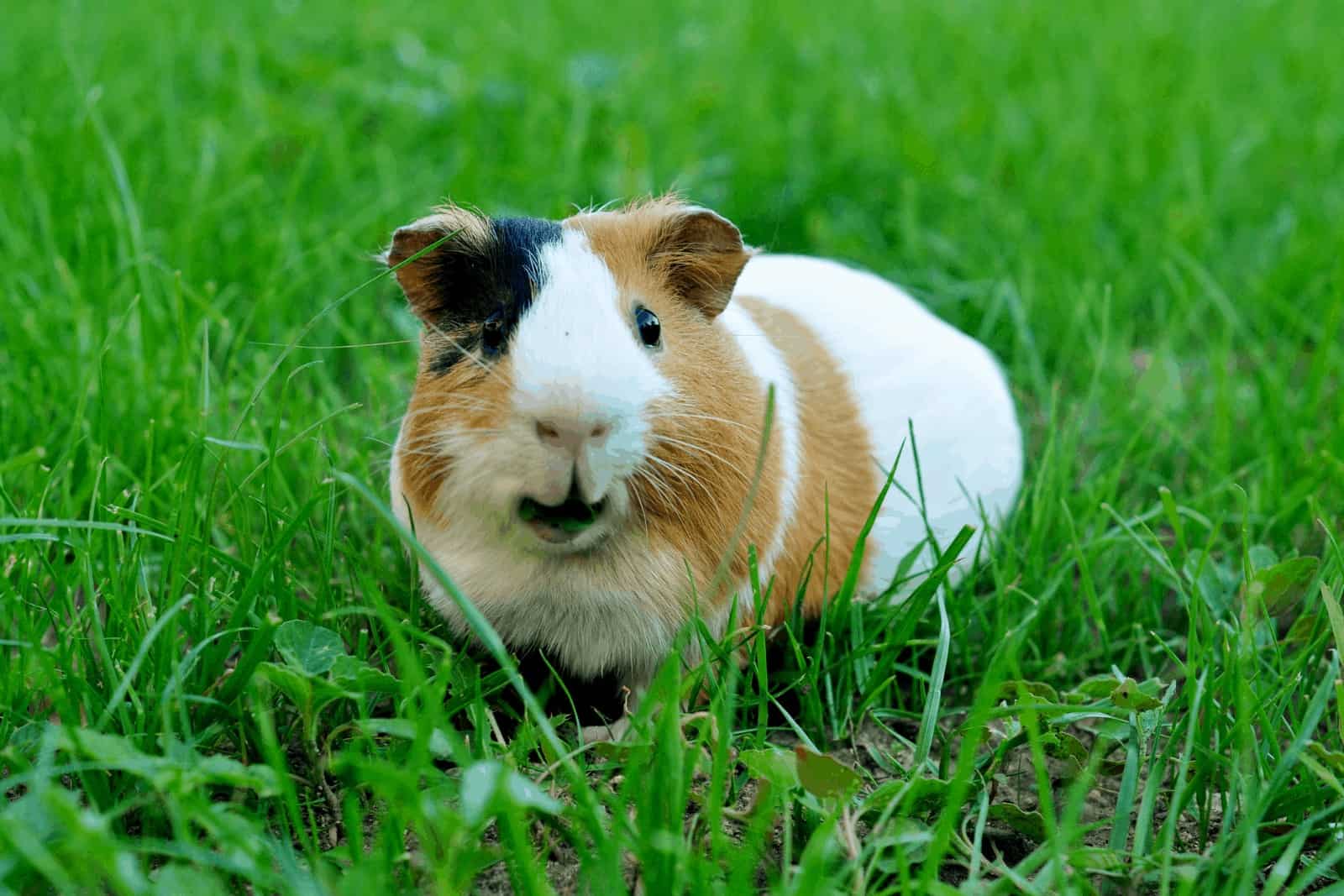Can guinea pigs eat grass instead of hay?
You may be out playing with your guinea pigs and observe them munching on the grass on your lawn.
Or perhaps you ran out of hay and it’s is the only option before you can get out to get more.
So, let’s discuss whether grass is a safe alternative to hay for your cavy!
READ MORE: What Fruit Can Guinea Pigs Eat?
Table of Contents
CAN GUINEA PIGS EAT GRASS INSTEAD OF HAY?
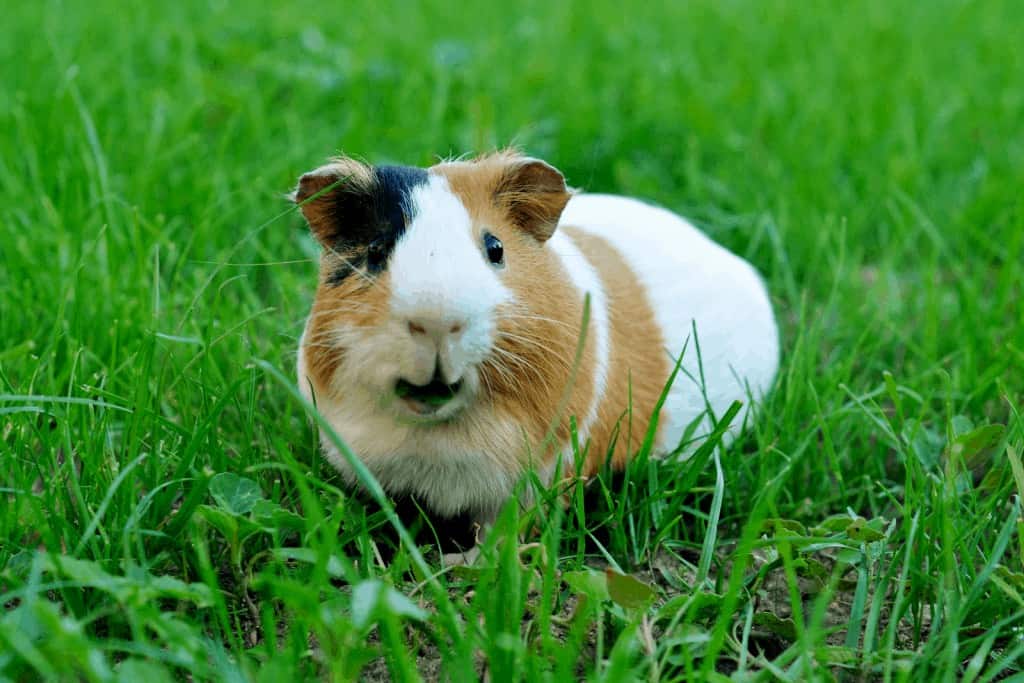
Yes, guinea pigs can eat grass since it contains some helpful nutrients.
However, it can’t replace hay since hay has roughage and nutrients your piggies can’t get in any other foods.
Grass from the lawn may also contain pesticides, weed killers, or any other chemicals that may be harmful to cavies.
Hay is actually dry grass. The only difference is the type of grass used to make the hay and the types of grass you have in your backyard.
Please keep reading to find out more about grass and other types of food you should feed your pet.
CHECK: The Best Guinea Pig Hay
Feeding Guinea Pigs grass
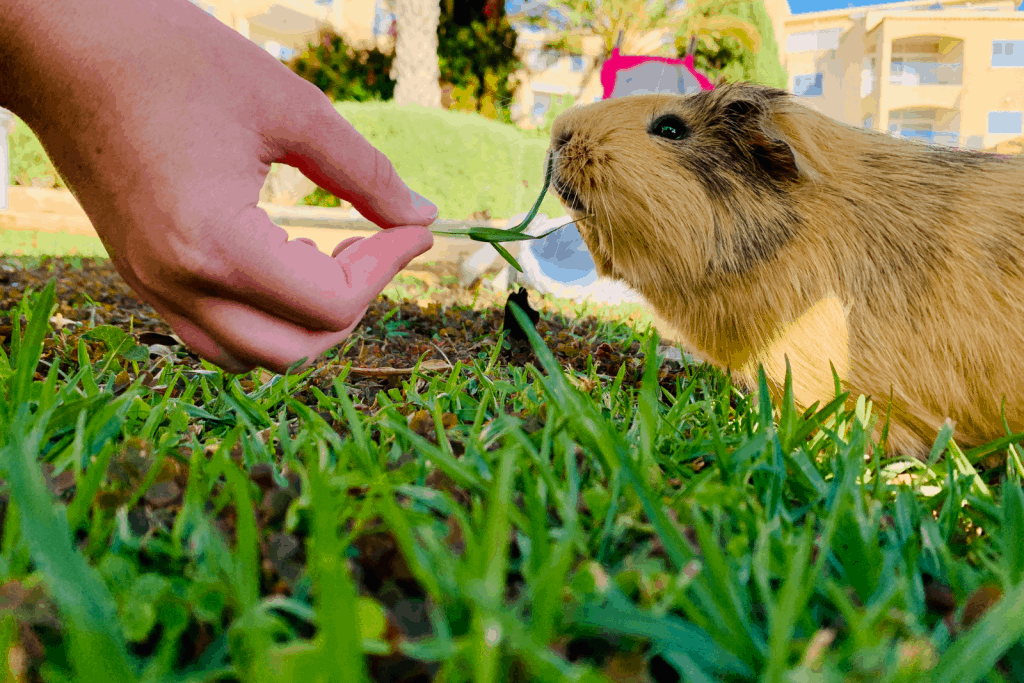
Guinea pigs are herbivores. This means that even before they were domesticated, they probably fed on grass when in the wild.
Fresh grass has the following nutritional benefits for your piggy;
- It’s a good source of Vitamin C
- Grass controls the amount of cholesterol in your piggies body system
- Excess cholesterol could lead to heart issues and other health issues.
- Grass has a lower sugar content level (fructose content) compared to other foods.
- When fed together with other foods, it prevents high blood sugar levels in guinea pigs, which can actually lead to death.
- Grass improves your guinea pig’s dental health since it controls their teeth’ growth.
The fact that it’s a good source of Vitamin C is definitely one of my favorite benefits.
Vitamin C is essential for guinea pigs since it facilitates collagen formation, which is vital for bone formation, repairing tissues, and blood vessel integrity.
As your piggy grows older, she may get injured often. But Vitamin C can speed up the healing process and prevent inflammation.
However, guinea pigs are unable to synthesize or store Vitamin C on their own. So they need to be fed foods rich in vitamin c, and even Vitamin C supplements.
Check: Can Guinea Pigs Eat Sprouts?
How Much Grass Can They Eat?
According to Canadian Living, Guinea Pigs’ digestive systems are meant to handle lots of forage.
So your cavies can feed on as much as they can. And most of them actually enjoy it.
However, as I mentioned earlier, hay remains the most viable choice among guinea pigs since it contains most of the nutrients that the pet needs.
So hay should form at least 80% of your guinea pig’s diet. The other 20% can be grass, pellets, and other types of foods.
If your guinea pigs have not fed on grass before, start with small quantities and increase gradually.
Avoid feeding them too much of it at once since you may end up with a sick cavy.
Check out this video to learn more about it:
Can You Feed Guinea Pigs Fresh Grass From Your Lawn?
While it is cute and fun to watch your guinea pigs munch on the grass on your lawn, it is not safe. Below are some reasons;
The grass may contain harmful chemicals
To make sure lawns are lush green, we may use weed killers, pesticides, chemical fertilizers, all of which leave residues that could be toxic.
These residues can last for a long period of time on the grass or in the soils. And washing the grass also won’t help to get rid of them.
The grass may contain molds
Most pets, including guinea pigs, are susceptible to mold poisoning. And since grass is one of the plants that attract molds, it would not be a good idea to let your pets graze freely.
Mold is known to cause respiratory infections, and it attacks other internal parts of guinea pigs.
Besides molds, insects, insect eggs, and other harmful items may be hiding on the soil or the grass’s blades.
Allergies
Some guinea pigs may develop allergies to grass. So if you notice coughing or sneezing as they feed on the grass, it’s best to take it away from them. And contact your vet as soon as possible.
Contaminated grass
If you have other pets, such as dogs or cats, they may contaminate the grass by defecating or urinating on it. This makes it unsafe for your pet.
If you’re sure that your lawn has no pesticides or other chemicals, then you can take your guinea pigs outdoors and allow them to munch on the grass.
Related: Toxic Foods for Guinea Pigs
Can Guinea Pigs Eat Grass Clippings?
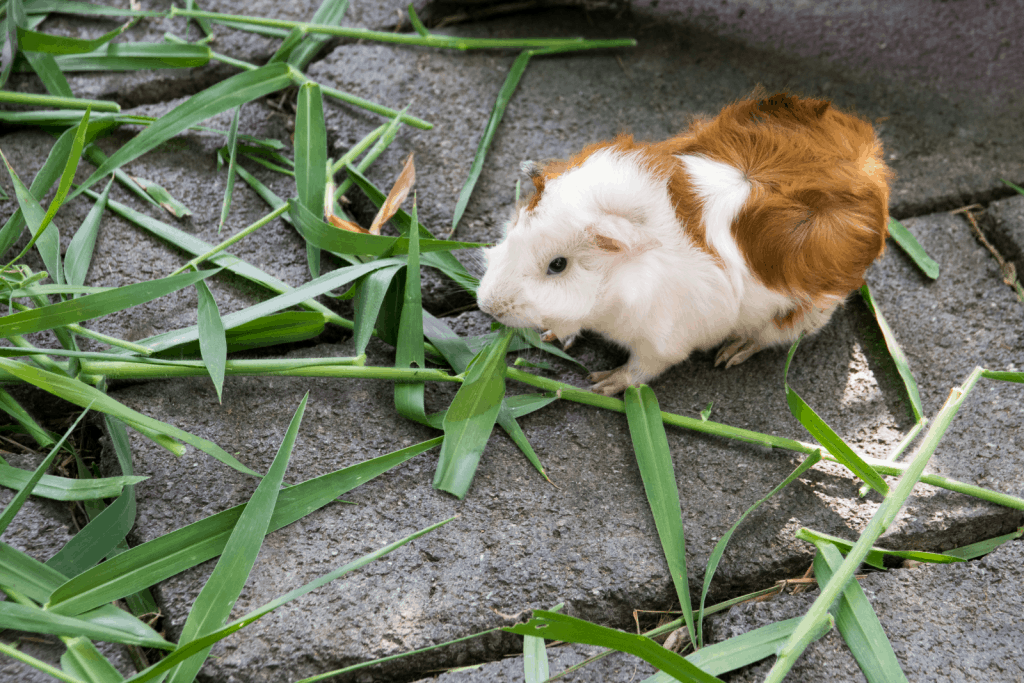
Grass clippings from your lawn aren’t safe either for your guinea pigs.
Besides containing chemicals, grass clippings undergo fermentation at a faster rate compared to fresh grass on the lawn.
Feeding your guinea pigs fermented grass could lead to bloating and other digestive issues.
Types Of Grass That Are Safe For Guinea Pigs
IF you have the following grass types in your lawn, you can comfortably allow your guinea pigs to feed on them.
Wheatgrass
This is one of the best and most nutritious types of fresh grass you can feed your guinea pigs. As the name suggests, it’s extracted from the wheat plant. It’s simply the newly germinated shoots of a wheat plant. It contains potassium, fiber, Vitamin A, Vitamin C, and enzymes. It also helps prevent scurvy in guinea pigs thanks to the higher levels of vitamin C. If you’ve come across cat grass, that’s still wheatgrass under a different name, and it’s safe for your pet.
Bermuda grass
This type is also safe for your piggies. This is thanks to the balanced amounts of proteins, fat, and crude fiber.
Grass clover
Clover is also safe for piggies, but make sure it’s grown organically. It would help if you also fed it to your pets occasionally since it contains high calcium levels.
IF you’re good at growing stuff, you can consider growing your own grass.
That way, you’ll be assured that it’s organically grown. And you’ll have a constant supply of grass.
Wheatgrass is the easiest to grow. You can grow it both indoors in containers or outdoors.
Types Of Grass You Shouldn’t Feed Your Guinea Pigs.
Below are some types to avoid;
Lemongrass
So why not can guinea pigs eat lemongrass? Actually, lemongrass is not safe for your pets since it contains high levels of calcium. It also contains citronella oil which is harmful to guinea pigs.
Pampas grass
It is also not safe since it may contain toxins that are harmful to your pets.
Grass seeds
Grass seeds aren’t safe either for your piggies. They contain too much fat, which could lead to obesity. If you want to feed your pet hard cereals, consider oats, cheerios, and corn flakes. But only in small quantities to prevent rapid weight gain.
What Foods Should You Feed Your Guinea Pigs?
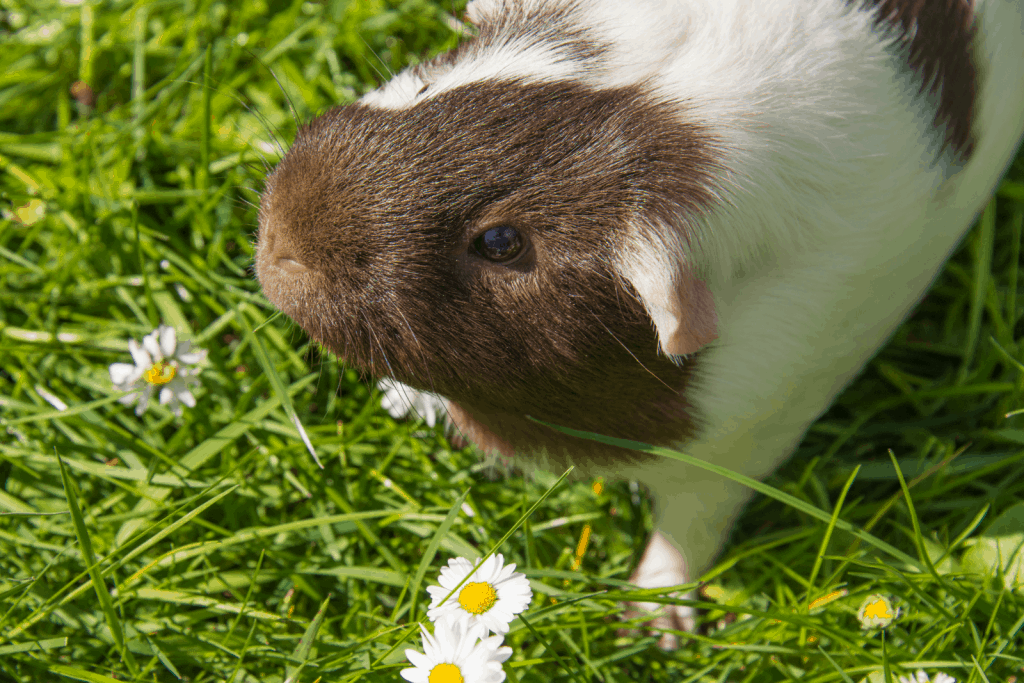
As mentioned earlier, guinea pigs are herbivores. They need lots of forage for gastrointestinal health, dental health, and overall well-being.
With that in mind, below are some of the types of foods you should be feeding your guinea pigs.
Hay
Guinea pigs should have an unlimited supply of hay. And not just any type of hay. Make sure it’s organically produced.
There are two types of hay you can feed your guinea pigs – grass hay or legume hay.
Grass hay is the best option since it has the necessary amounts of proteins, calcium, and it keeps your piggy’s calorie levels at the desired levels.
On the other hand, legume hay could lead to rapid weight gain and other health issues. It should only be fed as a treat.
Among grass hays, Timothy hay is the best to feed your cavies. It has a fragrant smell. And has the correct balance of fiber and other nutrients.
If your cavies are allergic to timothy hay, or you want to diversify the food they eat, you can consider Orchard hay.
It’s also sweet-smelling, and it has almost the same nutrient combination as the timothy hay.
Other types of hay to consider include;
- Bermuda hay
- If you have Bermuda hay that you’ve bought for cattle or larger animals, you can give some to your cavies.
- Meadow hay
- This type comprises the flowers, seeds heads, and grass parts of the meadow plant. It makes a good option since it offers more than just grass.
- Oat Hay – This makes a good option, especially for sick guinea pigs. This is thanks to the higher amounts of proteins, fat, and fiber.
Note – When purchasing hay for your piggies, make sure it’s green. Also, try to keep it off the ground with cardboard boxes, cartons, or other items.
Check the video below for more info about feeding hay to guinea pigs.
Pellets
Guinea pig pellets can form at least 20% of your cavies diet since they are packed with vitamins.
At least a 1/8 a cup per day will do. Make sure the pellets are designed specifically for guinea pigs. And it would be best if you purchased pellets based on Timothy Hay.
Leafy Vegetables and Herbs
Vegetables make a good addition to a piggy’s diet, but only as treats. They lack the required nutritional level for guinea pigs, and they’re sometimes too watery.
Some of the leafy greens you can feed your pet include;
- Spinach
- Cilantro (Check our complete guide: Can Guinea Pigs Eat Cilantro?)
- Kale
- Dandelion
- Arugula lettuce
- Carrot tops
Vitamin C Supplements
As we already know, Guinea pigs can’t make their own Vitamin C. So, besides feeding them foods rich in Vitamin C, you also should feed them Vitamin C supplements.
Foods like carrots, pineapples, berries, and the veggies I mentioned in the previous section are excellent Vitamin C supplements.
Final Thoughts
Allowing guinea pigs to graze on your lawn is healthy. But you should make sure the grass is clean.
It should be organically grown and shouldn’t contain any insect eggs or other harmful items.
Avoid feeding your piggies lawn clippings. Instead, cut the grass that she needs and feed it to her if grazing isn’t an option.
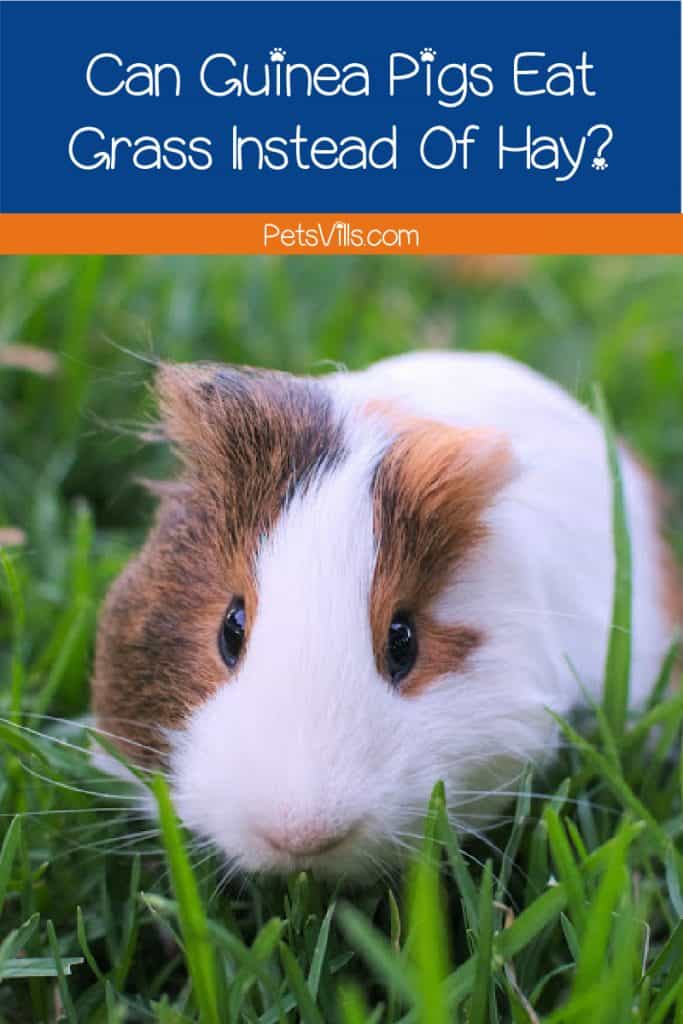
can guinea pigs eat grass instead of hay? What are your thoughts about it? share with us below!
Barry Stingmore is a British content writer living in Fuerteventura, Spain. An animal lover at heart, he shares his home with a dog and four rescue cats and has a passion for writing about animals big and small.
Barry loves finding answers to your animal-related questions, the more research involved the better! You can rely on him to find the facts.
Find him on FACEBOOK, TWITTER AND Linkedin
Read his latest ARTICLES.
Find more about him HERE.

